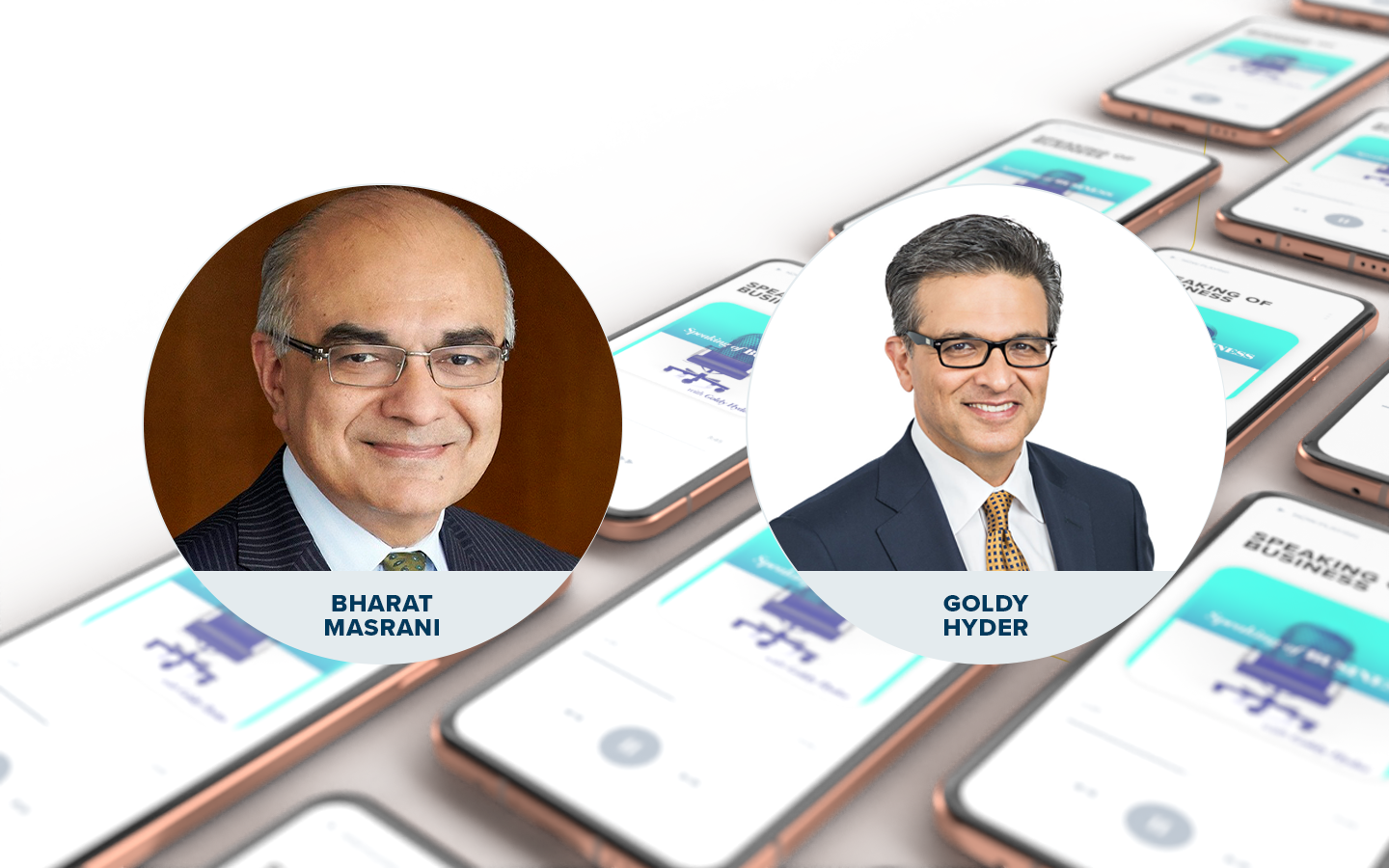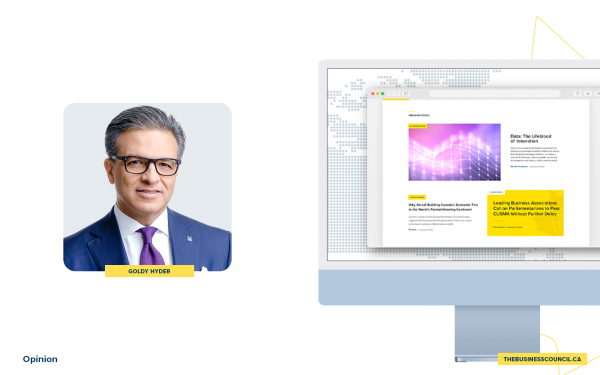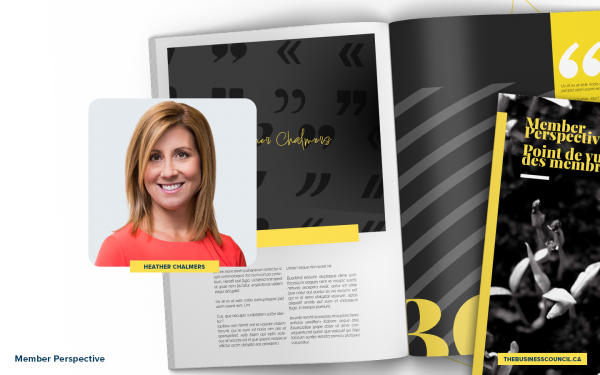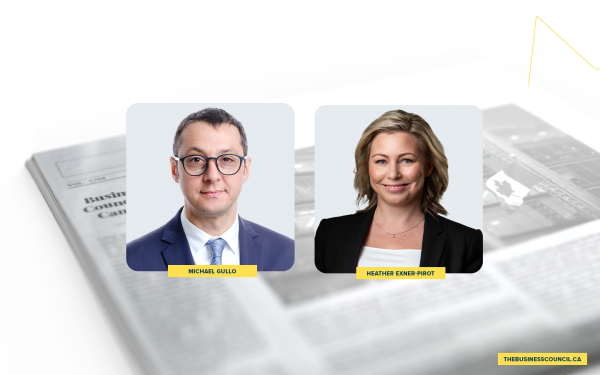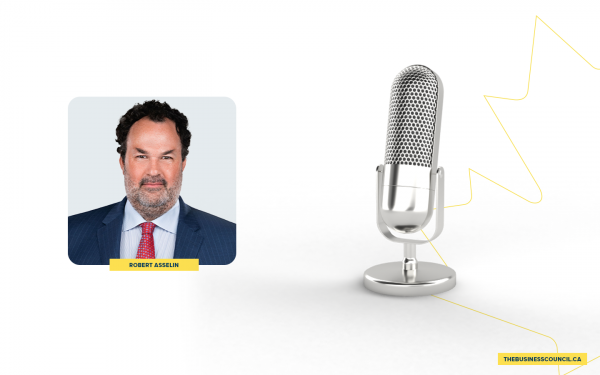Playing to Canada’s strengths in a post-pandemic world
When Bharat Masrani looks to Canada’s future, he sees opportunity. “We have all the tools in our toolkit to really leverage what is to come,” says the President and CEO of TD Bank.
In a January 25th, conversation with Goldy Hyder on the Speaking of Business podcast, Masrani points to strengths – such as Canada’s education system and highly skilled workforce – as key ingredients to help the country succeed in a post-pandemic world.
He also sees an important role for Canada’s energy sector as the country transitions to net-zero emissions. “You look at what those [energy] companies are doing – they’re on the leading edge of technology, the leading edge of how we reduce carbon,” he says.
Finally, Masrani points to the cooperation between the public and private sectors during the pandemic as a model for Canada to follow in the years ahead. “We are a country that is united in its vision. We want to be successful and we want success for all.”
Listen to Goldy Hyder’s conversation with Bharat Masrani on the Speaking of Business podcast.
Latest Podcasts
Transcript:
Bharat Masrani:
We know that as a country, we are blessed. We are very fortunate with the resources we have, the system of government we have, and we are a country that is united in its vision. We want to be successful and want success for all.
Goldy Hyder:
Welcome to Speaking of Business, conversations with Canadian innovators, entrepreneurs, and business leaders. I’m Goldy Hyder, president and CEO of the Business Council of Canada. In 1987, Bharat Masrani started a new job as a trainee with TD Bank, three decades later, that trainee became TD’s Group President and CEO. Today, he oversees North America’s fifth largest bank and is responsible for 90,000 employees, and more than 26 million customers around the world. His career has spanned three continents and has weathered multiple recessions, massive digital transformation and now, a two-year global pandemic. In other words, he’s learned a thing or two about leadership and crisis management along the way. It’s a great pleasure to be able to speak with him today. Welcome to the podcast Bharat.
Bharat Masrani:
Nice to be with you Goldy. Hope you’re doing well.
Goldy Hyder:
Well, look, let’s get something out of the way here, because I’m going to get all kinds of texts and emails and saying, “I’m saying your name wrong.” But you know I’m of Indian origin. I’m actually saying your name, right. Right?
Bharat Masrani:
Hey, go with the way that makes you comfortable. I see Goldy in itself doesn’t sound like an Indian name.
Goldy Hyder:
Well, there’s another story behind that. Maybe you’ll have to have me on one of your podcasts sometime.
Bharat Masrani:
We should. We should. That should be fun.
Goldy Hyder:
All right. Well look, let’s start off, what I said in the introduction. I mean, hopefully there’s a bunch of bank trainees and entry level employees that are listening to this podcast. And I want you to just share your journey with them. Tell me how you go from kind of a trainee yourself to becoming the CEO of TD.
Bharat Masrani:
Well, Goldy you introduced me as a fellow Indian and I’m proud to be a fellow Indian, but my sort of ancestors immigrated to East Africa from India about a hundred years ago. And you may recall this, you and I have chatted about it. I grew up there and spent time in the U.K., which was quite common for kids at that time, and then the whole community was actually kicked out. We became refugees and moved to the U.K. and I came to Canada and decided to go to university here and make my life here. So, I’ve been in Canada for many, many years, did my BBA and MBA here, I was at the Schulich School in Toronto and then joined TD, and as a trainee, as you said. And what an experience it has been, and I’d say, it’s not common that you can join a company and have so many different roles under one roof.
And that’s what TD was able to provide to me. So I’d say, my advice, excel at what you do, be confident, do what you really like, what you have passion for, which is all the ingredients to make a great career. And then of course, you have to surround yourself with great people, take jobs that nobody wants, and before you know it magic starts to happen. And so for me, I’ve been very fortunate. Been with the bank 35 years, have done many, many jobs and it has turned out well.
And I say, the key lesson is to surround yourself with great people and people who are actually better than what you are and your job is to really, really motivate them and have the best come out of them. That’s how I was able to make my career. So, it’s worked out well and I got to put a plug for my bank, it’s TD and Canada, that gives an opportunity for a guy like me, from India via Africa, via U.K., can come here and make a whole career and a life in this country. So terrific, terrific environment in Canada. And of course at TD.
Goldy Hyder:
Yeah well said. I mean, I think we all have our challenges in Canada, but we’re nowhere else we’d rather live in the world. Is there?
Bharat Masrani:
That’s right. Without a doubt, and frankly, it is one of the strengths of Canada, it’s a diverse country, it is a tolerant country, it’s a multicultural country. And that in itself is hugely beneficial to what the future holds, post this pandemic, and hopefully we’ll be there soon.
Goldy Hyder:
Yeah. Well, I’m going to come to that shortly, but I want to, before leaving the first question, you’re in the risk business and one of the things we have seen as a trend in this podcast and talking to your peers, is the role of failure and / or the role of having taken risks in your career. Can you think of any moments in your life where you did take that leap if you will, or where you failed and learned?
Bharat Masrani:
Of course. I mean, failure in itself is an opportunity. I mean, God knows how many times I failed. There have been lots of situations where I thought, situations are not going to work out. And one that comes to mind was, and I joined the bank, I think this was about three or four years after I joined. And I made a huge mistake, a classic mistake in a bank. I took on a credit, took on a company that I shouldn’t have and did not make the right assessments and the bank lost money. And so I thought, the following morning when I go to work, I’m going to be asked to leave because it was a sizable amount. It was a huge amount at that point. And I remember my manager telling me, “Are you kidding me? We just spent X dollars teaching you what it is to be a banker. Why would we want to throw that experience away?”
“Because you are golden now, you’re not going to be making the same mistake ever again. And we are a bank, we are in the risk taking business and you got to learn to take risks. Now, in your case, the risk wasn’t fatal. It was close, but it was not fatal.” And that’s the one experience I will never forget because that is so true that all of us have to learn and we need that opportunity. We will fail as long as we don’t do it too often and don’t make it fatal, things do work out.
Goldy Hyder:
Well thanks for sharing that. Let’s talk about the fact that we are now in year three of COVID, and certainly you and I know that a lot of people, including people like in our own circle of friends are finding it hard now to be optimistic, that there has been a level of sort of frustration that has manufactured itself and peaked to some extent. So, I mean, first of all, how are you doing and how are you feeling about where we are now?
Bharat Masrani:
Well, I’m doing fine Goldy, all things considered. I mean, nobody could have planned to live like this, to go through a lockdown. The last two years have been, quite something and all of us have personal stories. I’m sure you do. In my case, my family is all over the world. I’m a grandfather, I have a little grandson who lives in Italy, I’ve not been able to see my son and my grandson for more than two years now. So, I know it’s been tough, tough on everyone, but I’d say given where we are today, we are in a much better situation than we were a year ago, or even in March of 2020. We have vaccines, we have treatments, the science has caught up, we know, medically how to live with this virus.
So, we’re in a much better situation. And I think, given all that has happened, the future is very bright. We will come out of this. I can tell you one thing, the economic disruption means opportunity, and I think opportunity for Canada, opportunity for Canadian companies. And I see those days ahead of us and I know it’s going to be tough, but I want to say that, as a country we’ve adapted really well, as a society as well. We’ve been there for each other, we’ve made sure that the most vulnerable among us are cared for and made sure that all the vaccines and all the treatments are made available.
And I’m immensely, immensely grateful to everyone working tirelessly on the front line of this crisis. It’s just amazing. And I’d say one thing I would add, as a banker and at my stage in life, all of us have seen so many crises in our lives. They’re all different in many, many ways, but one thing in common, all of them end and this too shall end. And that’s the way I see it, and I see, much brighter future than where we were a year ago or even six months ago.
Goldy Hyder:
Well, they say adversity builds character, I suppose that’s true, not just for individuals, but institutions themselves. What do you see as a takeaway for yourself or for the bank about how you navigated this crisis?
Bharat Masrani:
Well, when you get into a crisis, the typical sort of aspects of leadership matter, right? You identify the problem, you organize a team around it, you set clear objectives, your guiding principles. You make sure the right talent is addressing the right issue and decision rights are clear, and then make sure that you’re communicating and sharing your vision with your people to get to the other side. I mean, that’s the classic way of handling any major problem, any major crisis. I think the one aspect that is very different, at least for me, was the requirement to do all that in a virtual world. Some of us find it very comfortable and it’s a strength that you can get together with people in one room, that you can see the body language, you can shake hands, you meet and you collaborate and you celebrate and you recognize. Well, this was different from that perspective.
So we needed to adapt to this new reality of how to do all those things that you normally do in a crisis, but do in a virtual world. And I got to give it at least for my own experience in our teams in TD, did a fantastic job. In a matter of days and weeks, we were able to have tens of thousands of people connect virtually. We were able to have our guiding principle number one met, how do we maintain the health and safety of our own people, as well as our customers you know? How do we keep our operations secure and stable? And how do we meet customer needs? Because we are an essential service. So just a fantastic performance by our teams to be able to do that.
And in my own case, the type of crisis management, I just outlined, we were able to do that virtually and then connect. I was able to connect with tens of thousands of our people in town halls and, we had a whole CEO Connect series, which was terrific and was able to get what life was in the front lines. What different parts of the bank, how they were adapting, how they were managing and were able to take all that in, and have our people actually deliver for our customers. So, lot to learn here, I think there are going to be lots of lessons here that nobody is ever going to forget. And frankly, the new ways of working is not going to go away, it’s going to be a hybrid world. We will be using these tools, these techniques, this way of connecting for many, many years to come.
Goldy Hyder:
Well, it’s pretty evident that you and I certainly love this country. And part of love sometimes is having to have some tough love, and you just referenced the need to look back when this is over and ask ourselves, how did we do, what did we learn? And I’m wondering as you, had a pretty good front row seat to how the country functioned, how our federation functioned, how our leaders performed, how do you feel about that? How do you feel that Canada fared through this crisis?
Bharat Masrani:
I think Canada, overall did pretty well. I mean, when you think of the response, as you say, response to the pandemic… We have a federation as you say, but we are a united federation, we trust in various institutions in our country, and when this crisis was upon us, the country rallied around the need at the time to be safe, to be healthy. The lockdowns worked well, the government programs at the outset to support Canadians because… It became illegal Goldy to leave your home. It became illegal to perform your work, and how do you survive in that world? So I think the support systems that were put in place immediately was absolutely the right thing to do by various governments.
And I’d say, major corporations and I can talk about the bank. Banks rallied around and said, “How do we put in deferral programs for Canadians to make sure that they can meet their financial needs without worrying about what happens to the next payment?” Interest rates were reset, new loans were made. And this was done in a world where the economy had stopped. It had dead stopped. And I think as a country, we did pretty well, I think, to manage through that crisis because we are seeing lots of examples in the world, some good ones, but many bad ones, where they were not able to come together to rally around the cause saying, “Hey, we are going to come out of this and we’re going to come out of this stronger and more resilient.” So, I think as a country, we did well.
I think the big question here is the future. What is the future? What are we going to do in the future? And I’d say, for Canada Goldy, my view is, this is a terrific opportunity for us. The economic environment has changed. The crisis has meant more opportunity, more industries have cropped up that matter in the future. And for Canada in that world, we have all the ingredients, we have all the tools in our toolkit to really take advantage and really leverage what is to come here. We have a legal system that people respect.
We have a system that is transparent. We have a highly skilled workforce. We have an education system that is second to none. Can we put all these things together and say, “Hey, this new opportunity in front of us, what do we need to do to take our characteristics that are so needed and put it all together.” And frankly, there are other forces at play here where Canada, again, can play to its strengths. Like climate change, sustainability, and these are all the environmental things that are happening around us. And how do we take the characteristics, the strengths of Canada and put it all together and frankly leverage these opportunities for the future. So I think lots of lessons here, but I am very optimistic about the future and what it holds for Canada.
Goldy Hyder:
Well, let’s unpack some of that because you said a lot of things there. First of all, I agree with you on optimism, I think Canadians have reason to be optimistic for all the reasons that you cited. We have the vaccinations, we have the screens, we have the capacity to track and trace and do the things that we need to do. And let’s hope that this variant is the end of it and we’ll be coming out of it. But as you said, it’s the question of where to from here, what does that look like? I want to ask about one of the lessons about the pandemic in my mind is how government and business work together to solve problems on behalf of Canadians. Because my theory is, it worked best for the national interest when in fact, government and business worked together to execute the outcomes that were necessary.
So whether we’re talking about the PPE response, whether we’re talking about the vaccine formation and the distribution, whether we’re talking about deploying the rapid screening programs, the mortgage relief. All kinds of things, business helped execute some of the government’s own financial programs as you know. Can we do more of that? I mean, is there a need to have a more formal business government relationship? Because we’ve entered some would say an era of big government.
Bharat Masrani:
I couldn’t agree with you more as to what we were able to do and you’re so right. One big aspect of how we managed through this crisis was that cooperation, governments and businesses and frankly Canadians coming together. Take the example of banks, I mean, all the banks and we have terrific, globally competitive banking system, got together with governments and various levels of governments and put in programs like the CEBA program and the stimulus cheques that were sent out. And these programs were put in place over a weekend, that would touch millions of people, millions of businesses and frankly, the distribution of funds was so efficient that other countries were looking at Canada and said, “How are you people pulling this off?”
And so this is just one example of what you are saying, what can we take in a non-pandemic world, from the experience of the pandemic and leverage that even more. So, I’d have to agree with you that there is an opportunity there, and obviously now, when you are in a very difficult situation, sometimes making the rules up as you’re going along, because there’s really no playbook. And so I think in a non-pandemic environment, things would be different, there would be probably be more rules or criteria that would have to be managed, but when in an emergency you got to do whatever it takes to get to the other side.
So there’ll be some adjustment but I think your core point, that can we take this lesson of governments and businesses working together to achieve the same end here and all of us want great things for Canada. There’s no disagreement, no ambiguity as to what all of us are striving for. And then your point on certain lessons here like PPE, and there are going to be some global trends here, where countries are not going to be relying on other countries for basic medical needs, and we have to figure out a way to adapt to that as well, and we already are. And you can see that happening on the vaccine front, you can see it on the PPE front, and I’m sure there’ll be other examples as we move forward.
Goldy Hyder:
The Business Council of Canada has been calling for a need for a really deliberate and intentional industrial policy for the country. An opportunity to do as you’ve said, seize the moment and figure out what we want to do as we go forward. And I think we would agree that it starts with investing in people. And obviously one of the great challenges that CEOs are facing today and businesses around the country are facing today. It’s actually a global issue, is the war on talent. How are you managing as a bank the issue of labor shortages skills, re-skilling the transition that is taking place in real time?
Bharat Masrani:
Yes, there is a transition. Yes, there is a labor shortage. The concept of the great resignation is in Canada and in other jurisdictions where TD operates. But folks want to be associated, they want to be part of an organization that is purpose-driven, they want to be with an organization that shares their value. I think you start with the basic premise, when we talk about labor shortages, I don’t want to say that we have zero labor shortages at TD, but I am proud to say that, we appear based on what I hear from others, to have less of a problem in that regard. And then of course, it’s incumbent on large corporations to set up their folks for success and what are you doing to develop people?
What are you doing to ensure that you’re providing them with the right tools, the right opportunity, and how do we make that happen? So, I don’t want to put all this on public policy makers. I think, companies themselves have to adapt their own workforces for the future, they got to adapt as to what is required, what kind of skills are necessary. Having said that, there are certain aspects that we need to work on. Like I mentioned, answering your other question, we have terrific institutions. I take, AI and engineering talent required for the future.
I mean, Canada is a hotbed of talent, of expertise. We got great universities that graduate terrific people. And what do we need to do in this world where talent matters, talent is the key differentiator, skill sets matter, and how do we make sure that we have the right opportunities here in Canada for these folks to thrive and not look to leave Canada? So I think that is a major question for us as a country to grapple with. But, the fact that we are talking about it, is a good sign. Like I have learned, unless we define a problem, none of us will look for solutions. So, there is a problem that we need to find a way to make sure that Canada has the right talent, and we have an economy that allows that talent to grow and thrive in Canada.
Goldy Hyder:
The other issue that you put on the table just now is climate change – something else that’s a priority for the Business Council. What exactly, I mean, what can a bank do about climate change? What are you doing about climate change and where do you see the opportunities?
Bharat Masrani:
Well, first we start with the premise that, it is an issue. It is interesting, around the world, there’s a debate going on as to the degree of the problem and all that. So let’s start with the premise that climate is a problem. It is an issue, and it needs to be managed and it needs be addressed. Let me talk about what we’ve done at TD. We totally believe in moving to a low carbon economy, we are all for net zero. In fact, I think we are the first Canadian bank to have a climate action plan, which we announced that we will target to be net zero in accordance with the Paris Agreement by 2050. And we have set up teams to address how we are going to do that. We’ll be setting up interim targets, et cetera.
And this is not only regarding our own operations, but when we provide financing to those companies and how we’re going to measure their carbon intensity. But the key point there Goldy, is that we cannot flick a switch and get to a net-zero world. We cannot get there tomorrow because we would wish to be there, we can’t wish ourselves there. This is a transition. It has to be an orderly transition. And frankly, for Canada, this transition is critically important. We are a resource rich economy and we need to work through the transition in a sensible and orderly manner. So, my view is that, yes, we are all for the transition. Yes, we are all for the net-zero world, but through this transition, we do need to support responsible energy development. Because otherwise we are going to lose our populations to drive towards the net-zero world.
We are already seeing that, all of us are talking about inflation that is now upon us and saying, “Wow, you’re having lineups in the U.K. because people can’t get fuel. You are having governments change their mind because the populations are not willing to accept the world where prices are going to go too high. So, we have to manage this in a sensible way, through a transition, and that’s what TD has been professing. And frankly, that’s what we are committed to do. So, that’s the background of what we need to do now. In that world, we know that through this transition technologies need to be invented. Technologies need to be discovered, we need talent to actually get us there, because in today’s technology, we cannot get to the net-zero world. So what can Canada do there? Well, huge opportunity for Canada.
Yes. We have a huge resource base in provinces like Alberta, but you look at what those companies are doing. They’re on the leading edge of technology, the leading edge of how do we reduce carbon, how do we reduce global warming, the greenhouse gases, that is a major headline here, and they’re among the world leaders here. So, I could go on and on but I think for Canada, transition is important. We need to make sure we are setting up the right industries for the future here. But in the meantime, we got to support responsible energy development, because that’s the only way to get there in an orderly manner.
Goldy Hyder:
Well, I do think the banks and financial institutions more broadly are going to have a lot to do with this, because it’s not going to come cheap. Right? It’s going to come at a cost. And I think both governments and businesses need to be honest with consumers about that. Subject for another day, perhaps, but I appreciate your comments on climate change. I think we could have done the whole podcast on climate change. It’s certainly something that we’re consumed with, but I want to move on to another area that is top of mind for business leaders. And that is the state of the United States. It’s changing, I mean, there’s no denying, it’s changing. We thought it was an aberration, and that we would go back to normal and we clearly haven’t. And I’m wondering, because of course, you have a very impressive footprint south of the border. How are you navigating some of these changes that are taking place in the U.S. and how concerned should we be as Canadians about rising protectionism there?
Bharat Masrani:
Well, so, we do have a very large business in the U.S. In fact, more than a third of TD is now in the United States. As you know, we have fantastic footprint from Maine to Florida and a great business in different segments as we call them. We have a good retail business, as well as a very large and a thriving wholesale business. So the U.S. is a terrific market, is a terrific country. It borders Canada with the largest trading relationship and works well for the most part. But as you said, we go through phases here, where protectionism, political discourse, all these sort of topics deserve a podcast on their own. But I’d say generally speaking, this relationship has gone through various phases, ups and downs, and it has thrived and it has been terrific for both countries. And then, over the long term, I see that to continue.
I think we will have bumps in the road, without a doubt, when you’re going through major, major sort of crisis, like the pandemic, what’s going to be upon us with climate change, is going to cause a lot of stresses in all the countries. And then of course, you have the political discourse, where folks are on different sides. That’s why we should talk a bit about, when you have an economic recovery and we will have a huge economic recovery in North America, post this pandemic, we have to ensure that it’s an inclusive recovery, and this is the core of the problem. When you have a recovery that only benefits a few and many, many are left behind, that causes the problems that you just started with. That causes protectionism, that causes “us versus them.” That causes disunity where folks are for themselves and say, “What can I do just to survive myself?”
So, I think you got to start with that, and in Canada, I think we are very fortunate. We have a system that is geared towards that kind of a situation, but here we should as well be mindful that we have to ensure it’s an inclusive recovery that everybody thrives. Then the United States needs to work on that as well. So, on the one hand, I agree with you and things look every day, there’s a new headline and all of us react to it. I think on the long term, when you helicopter up, this has been a terrific relationship. It’s been advantageous for both countries, and ultimately, I think we go back to where we started from. This will be behind us as long as we manage these difficult sort of forces that are upon us and the pandemic has something to do with it. And hopefully when we are past it, we can get to somewhat of a business as usual environment.
Goldy Hyder:
One of the things that is going on out there, of course, as I mentioned earlier, is this war on talent. And of course, America can be very aggressive in taking our talent. Does that keep you up at night at all?
Bharat Masrani:
It does, but I’m not blaming America, I think talent goes where there’s an opportunity. I think as a country in Canada, that is one issue we got to address. How can we make sure that folks who are highly talented, they graduated from Canadian universities, they love Canada, how do we provide an environment to those individuals and say, “Hey, you can stay in Canada and have a terrific life, a very successful life, you can strive here?” Because, what’s the point, if we cannot give them that opportunity, then they want to go where the opportunity is. And that’s what America is all about, they do provide that opportunity. So I think there’s a lesson for Canada, that there are things we need to do to keep the talent here.
There are, you talk about industrial policies, I mean, that’s a phrase from the ’60s Goldy. But there is need for some kind of a conversation, what do we need to do to choose industries where Canada can be a global leader, like we have been in our history. Is artificial intelligence, that industry? Is technologies that are going to emerge to address climate change are those the new industries? And what do we need to do as a country to make sure that the talent that is required to strive and be successful, stays in Canada? And that’s a challenge for us, but I think it’s something that policy makers and big businesses need to think about and talk about and come up with the right solutions.
Goldy Hyder:
Yes, I take your point. It’s an old phrase, but I think what it suggests is that, we haven’t had to do anything. It’s been pretty easy being Canada, right? We’ve been blessed with geography. We’ve got America right next to us, but now we’re alone and we really need to be deliberate in going forward. I just call it a strategy. What’s the strategy for the country to be honest? And one of the things that has to be at the core of that strategy, is an issue we haven’t uncovered yet or discussed yet. And that is the issue of immigration, because immigration tends to be the lightning rod for populism. We saw that in the Trump administration and others. How critical is that in Canada for you?
Bharat Masrani:
Critically important to have immigration. Because I mean, we’ve been talking a lot about the pandemic. One thing, there’s absolute agreement on, that one way to actually manage the economy of the future with all the dislocations that have been created by the pandemic, like the debt, with the country has taken on a huge amount of debt. The only way to manage that, is through a growing economy. Growth is, I’ll use the phrase here, growth trumps all challenges, and we need growth.
And a key ingredient in growth for Canada, and we’ve proven this historically, we’ve seen Canada can outgrow, can outperform, and it happens through immigration, because we have a good policy, we’ve been able to attract terrific folks from around the world, who are highly talented and they come here and thrive and do very well in the economy. So I think… I know the government is already talking about the need for immigration, need to increase the level of immigration, because that’s going to be absolutely necessary in order to address, not only the implications of the pandemic, but what we need to actually be successful in the future.
Goldy Hyder:
Yeah. I think that’s extremely key. Look, I could go on with you for some time. I know you’ve got bigger things to do than this, but I wanted to end with a question that we’ve been asking our guests in this season. And that is really, in your mind, is there a big idea that you think could really help transform Canada?
Bharat Masrani:
Well, we’ve been talking about it, and I can’t think of a bigger idea than talent and skills and what is required to be successful. I mean, we know that as a country, we are blessed, we are very fortunate with the resources we have, the system of government we have, and we are a country that is united in its vision. We want to be successful and we want success for all. And what we need there, we talked about immigration, we need growth, and we need the right talent. We need to make sure we have the right skills. And if we can bring all those things together, I have every confidence that we can, that Canada’s best days are ahead of it. We have a terrific country and we have a terrific foundation. And if we make sure that the mix of talent and what you are calling industrial policy, if they all come together, it’s going to be terrific for Canada as we compete in this new world.
Goldy Hyder:
Well, that’s probably a great place to end on, because it is ultimately about leadership. And I think that if we put our minds to it, we can get to where we need to go. Thanks so much for making the time for this Bharat. I really appreciate it, and I enjoyed it very much.
Bharat Masrani:
Thanks very much Goldy. And I enjoyed it as well and all the best and stay safe.
Goldy Hyder:
You too my friend. Bharat Masrani is group president and CEO of TD Bank. If you would like to hear more of our Speaking of Business conversations with innovators, leaders, and entrepreneurs, why not subscribe to our podcast. Search for Speaking of Business, wherever you get your podcasts or go to our website, at thebusinesscouncil.ca, that’s thebusinesscouncil.ca. Until next time, I’m Goldy Hyder. Thanks for joining us.







